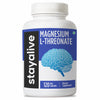The Essential Guide to Dietary Supplements: Separating Fact from Fiction

In today's fast-paced world, the pursuit of optimal health and wellness often leads many to explore the realm of dietary supplements. From vitamins and minerals to herbal extracts and protein powders, the market is flooded with products promising to enhance vitality and support well-being. However, choosing the right dietary supplements can be a daunting task. How do you separate fact from fiction and know the real benefits and risks of these products?
This guide aims to cut through the confusion, separating fact from fiction and empowering you to make informed decisions about incorporating supplements into your routine.
What Are Dietary Supplements?
Dietary supplements add specific nutrients – vitamins, minerals, herbs, or other substances – to your diet. They come in various forms, including capsules, tablets, powders, and liquids. While a balanced diet should ideally provide all the essential nutrients your body needs, deficiencies can occur due to various factors like dietary restrictions, medical conditions, or poor food choices. Supplements can then play a role in filling these gaps.
Common Myths vs. Facts
Myth: Dietary supplements are a substitute for a healthy diet.
Fact: While supplements can complement a healthy diet, they do not replace whole foods. A balanced diet rich in fruits, vegetables, whole grains, lean proteins, and healthy fats remains the cornerstone of good nutrition.
Myth: All supplements are safe and effective.
Fact: Not all supplements undergo rigorous testing for safety and efficacy. Some may contain contaminants or interact with medications, posing potential risks. To ensure quality and safety, it's essential to research products, consult healthcare professionals and purchase from reputable manufacturers.
Myth: More is always better when it comes to supplements.
Fact: Excessive intake of certain supplements can have adverse effects and may even be toxic. Following recommended dosages and avoiding exceeding tolerable upper intake levels is crucial to prevent harm.
The Benefits of Dietary Supplements
While not a substitute for a healthy diet, supplements can offer specific advantages when used appropriately. Here are some potential benefits:
-
Combating Deficiencies: Supplements can address nutrient deficiencies arising from dietary limitations, medical conditions, or certain medications.
-
Targeted Support: Specific supplements may target particular health concerns, such as omega-3 fatty acids for heart health or vitamin D for bone health.
-
Enhancing Nutrient Absorption: Certain supplements, like probiotics, can aid digestion and absorption of essential nutrients from your diet.
The Risks and Considerations
While dietary supplements promise to enhance health, they are not without risks. Contamination, mislabeling, and inconsistent potency are common concerns in the supplement industry. Additionally, some supplements may interact with medications or exacerbate underlying health conditions.
It's crucial to exercise caution, thoroughly research products, and consult healthcare professionals before incorporating supplements into your regimen.
Do Supplements Work? Understanding Efficacy
The efficacy of dietary supplements varies widely depending on factors such as product quality, dosage, and individual response. While some supplements have robust scientific evidence supporting their efficacy, others need more research or may yield inconsistent results.
Before determining supplement efficacy, it's essential to critically evaluate available evidence, consider potential biases, and consult reputable sources.
How to Choose the Right Supplements
With many options available, choosing the right supplements can be overwhelming. Here's how to navigate the selection process:
-
Consult Your Doctor: Discuss your dietary habits, health goals, and any medications you're taking with your doctor to determine if supplements are necessary and which ones might be suitable for you.
-
Do Your Research: Read labels carefully and research individual supplements to understand their potential benefits, side effects, and drug interactions.
-
Look for Quality: Choose reputable brands like StayAlive or brands with third-party certifications like FDA and GMP for quality assurance.
Integrating Supplements Into Your Lifestyle
Integrating supplements into your lifestyle involves more than just popping pills. It's essential to approach supplementation as part of a holistic approach to health, encompassing a balanced diet, regular exercise, adequate sleep, and stress management. Set realistic goals, track your progress, and adjust your supplement regimen as needed based on diet, lifestyle, and health status changes.
Conclusion
In conclusion, when used judiciously and responsibly, dietary supplements can support overall health and well-being. By separating fact from fiction, understanding the benefits and risks, and making informed choices, you can harness the potential of supplements to optimize your health.
Remember to prioritize whole foods, quality, and safety, and consult healthcare professionals for personalized guidance. With the right approach, dietary supplements can be valuable allies on your journey to a healthier, happier life.





